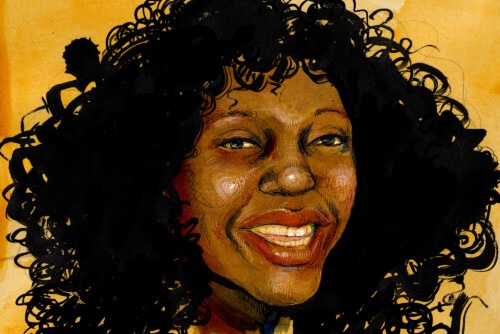Getting in the Way
A killjoy: the one who gets in the way of other people’s happiness. Or just the one who is in the way—you can be in the way of whatever, if you are already perceived as being in the way. Your very arrival into a room is a reminder of histories that “get in the way” of the occupation of that room. How many feminist stories are about rooms, about who occupies them, about making room? When to arrive is to get in the way, what happens, what do you do? The figure of the killjoy could be rethought in terms of the politics of willfulness. I suggested earlier that an activist archive is an unhappiness archive, one shaped by the struggles of those who are willing to struggle against happiness. We might redescribe this struggle in terms of those who are willing to be willful. An unhappiness archive is a willfulness archive.
Let’s go back: let’s listen to what and who is behind us. Alice Walker describes a “womanist” in the following way: “A black feminist or feminist of color… Usually referring to outrageous, audacious, courageous or willful behavior. Wanting to know more and in greater depth than is considered ‘good’ for one… Responsible. In charge. Serious.”1 Julia Penelope describes lesbianism as willfulness: “The lesbian stands against the world created by the male imagination. What willfulness we possess when we claim our lives!”2 Marilyn Frye’s radical feminism uses the adjective willful: “The willful creation of new meaning, new loci of meaning, and new ways of being, together, in the world, seems to be in these mortally dangerous times the best hope we have.”3 Willfulness as audacity, willfulness as standing against, willfulness as creativity.
We can make sense of how willfulness comes up, if we consider a typical definition of willfulness: “asserting or disposed to assert one’s own will against persuasion, instruction, or command; governed by will without regard to reason; determined to take one’s own way; obstinately self-willed or perverse” (OED). To be called obstinate or perverse because you are not persuaded by the reason of others? Is this familiar to you? Have you heard this before? When you are charged with willfulness it is as if your being is an insistence on being, a refusal to give way, to give up, to give up your way. Can what we are charged with become a charge in Alice Walker’s sense, a way of being in charge? If we are charged with willfulness, we can accept and mobilize this charge.
We have to become willful, perhaps, to keep going the way we are going, if the way you are going is perceived to be “the wrong way.” We all know the experience of “going the wrong way” in a crowd. Everyone seems to be going the opposite way than the way you are going. No one person has to push or shove for you to feel the collective momentum of the crowd as a pushing and shoving. For you to keep going you have to push harder than any of those individuals who are going the right way. The body “going the wrong way” is the one that is experienced as “in the way” of the will that is acquired as momentum. For some bodies mere persistence, “to continue steadfastly,” requires great effort, an effort that might appear to others as stubbornness or obstinacy, as insistence on going against the flow. You have to become insistent to go against the flow; you are judged to be going against the flow because you are insistent. A life paradox: you have to become what you are judged as being.
It is crucial that we don’t assume that willfulness is simply about lonely individuals going against the tide of the social. At the same time, we can note how the social can be experienced as a force: you can feel a force most directly when you attempt to resist it. It is the experience of “coming up against” that is named by willfulness, which is why a willful politics needs to be a collective politics. The collective here is not assumed as a ground. Rather, willfulness is a collecting together, of those struggling for a different ground for existence. You need to be supported when you are not going the way things are flowing. This is why I think of a feminist queer politics as a politics of tables: tables give support to gatherings, and we need support when we live our lives in ways that are experienced by others as stubborn or obstinate.




